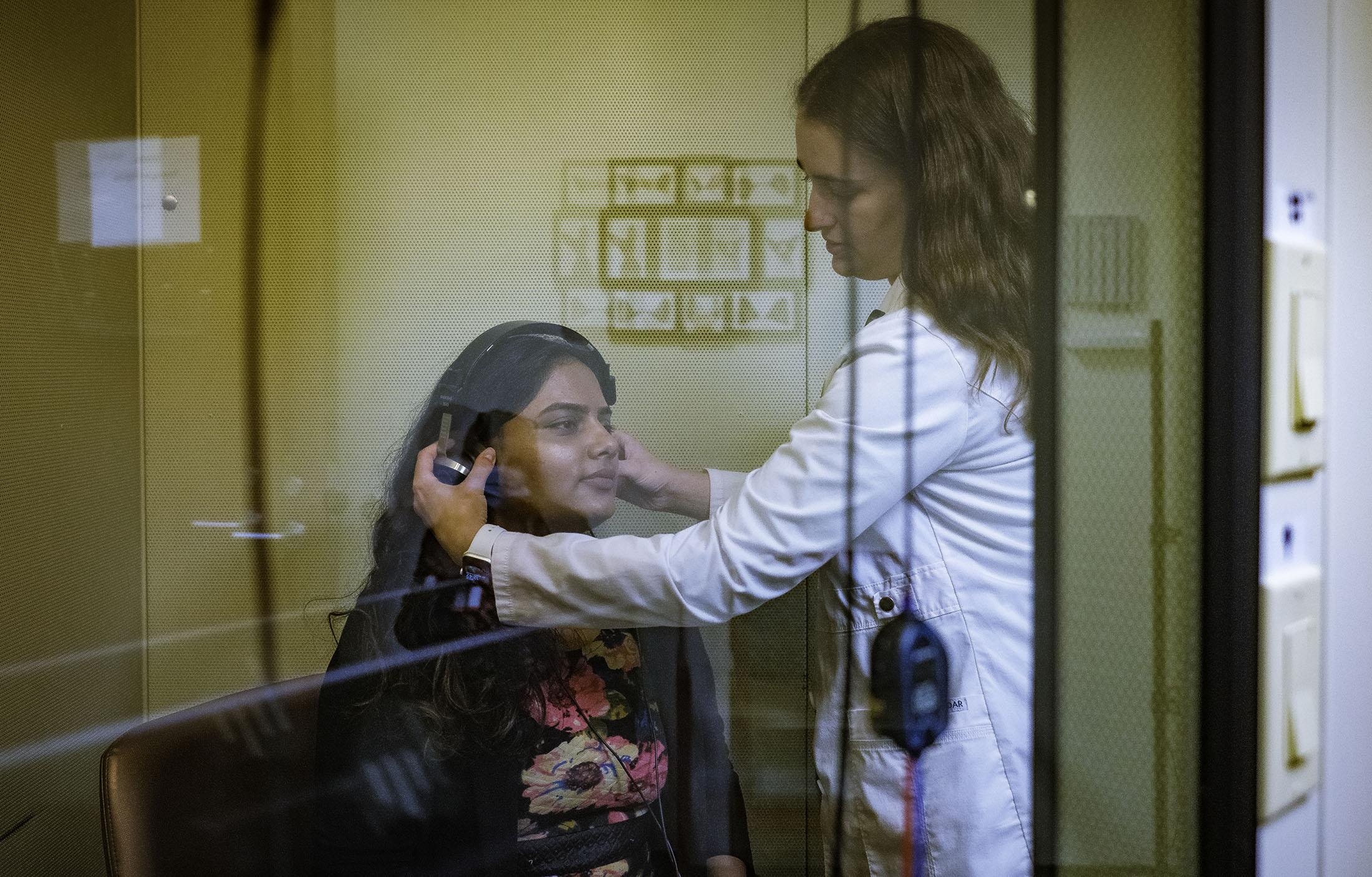Vestibular Diagnostics and Audiology
Overview
Vestibular neurophysiology is the study of vestibular system function, and Audiology is a scientifically based, clinical discipline that involves the study and assessment of hearing and balance disorders.
Audiology
The Audiology team at the UW Otolaryngology-HNS is dedicated to the identification, assessment, and treatment of individuals with hearing disorders. Our Audiologists work closely with highly trained vestibular (balance) specialists, otolaryngologists (ear, nose, and throat physicians) and otologists/neurotologists (specialty trained ear surgeons) to develop treatment plans for those identified with hearing and/or balance problems.
Audiologists use various testing procedures to determine someone’s hearing status; whether that be within the normal range or not. The audiologist will determine what parts of the auditory system are damaged and how hearing is impacted (low, middle, or high pitches) and to what extent. If it is determined that an individual has hearing loss, recommendations will be provided as to treatment options such as assistive listening devices, hearing aids, auditory implants, counseling, rehabilitative therapy, and/or, appropriate medical referral.
Vestibular Diagnostics and Rehabilitation
The Vestibular Diagnostic team at the UW Department of Otolaryngology – HNS provides assessment of vestibular disorders serving as the diagnostic arm of the UW Dizziness and Balance Center, a conjoint service of the Departments of Otolaryngology Head and Neck Surgery, Neurology, Neurological Surgery, Ophthalmology, Psychiatry and Behavioral Sciences, and Rehabilitation Medicine.
Evaluations include:
Computerized Dynamic Posturography (CDP)
This test places a patient in a wobbling room to assess balance function under conditions where one or more sensory cues to aid in balance and orientation are compromised. The test can also assess the integrity of the functional reflexes that allow one to maintain balance
Dynamic visual acuity assessment (DVA)
This test evaluates the ability of a patient to see clearly when the head is moving. This computerized test can detect functional changes associated with loss of vestibular reflexes that stabilize the eye.
Gait assessment
These tests evaluate the ability of a patient to walk normally in situations which challenge balance, such as when turning the head, or changing direction.
Rotary Chair Testing
These tests evaluate the function of the vestibular system by rotating the patient in various ways in a computer-controlled motorized chair. Rotational tests are especially useful in assessing bilateral loss of vestibular function, function of the utricle, adaptation to vestibular loss, and central processing of vestibular signals.
Static and dynamic subjective visual vertical
The static test evaluates the ability of a patient to perceive vertical orientation using only vestibular cues. The dynamic test evaluates the ability of one of the vestibular organs (the utricle) to inform the brain of orientation with respect to gravity.
Tone and pressure tests
These tests evaluate the response of the vestibular end organs to changes in sound and pressure. These tests are useful in identifying a defect in the membranes of the inner ear or in the bone surrounding the inner ear.
Vestibular evoked myogenic potentials (VEMP)
These potentials measure activation of reflexes that stabilize the eyes and head in response to head motion by activating eye and neck muscles, respectively. Cervical VEMP (cVEMP) looks at changes in neck muscle activity in response to stimulation of the vestibular end organs with loud sounds, taps, vibration, or electrical stimulation. Ocular VEMP (oVEMP) looks at activation of the eye muscles using similar stimuli. These tests are very good at assessing the function of the vestibular organs and pathways that detect linear motion and tilt with respect to gravity.
Video head impulse testing (vHIT) and coil testing
These tests evaluate eye movements that normally compensate for rapid head motion. They can detect loss of function in individual end organs in the inner ear. The coil test uses a small contact lens in a magnetic field and can detect very subtle changes in the function of these reflexes.
Video-nystagmography/electronystagmography (VNG/ENG)
This test evaluates eye movements that result from problems with the vestibular organs of the ear or nerve, as well as evaluating eye movements that result from abnormal central (brain) processing of movement information.
Providers
Erin Christianson, PhD, MBA, CCC-A
CLINICAL ASSISTANT PROFESSOR; CHIEF, PEDIATRIC AUDIOLOGY
Clifford R. Hume, MD, PhD
ASSOCIATE PROFESSOR
James O. Phillips, PhD
RESEARCH PROFESSOR
Jay Rubinstein, MD, PhD
PROFESSOR AND VIRGINIA MERRILL BLOEDEL CHAIR
Clinics
Harborview Medical Center
At the Otolaryngology General Clinic at Harborview our multidisciplinary team is available to assess and treat all patients with any pathology/complaints related to Otolaryngology Head and Neck Surgery.
Virginia Merrill Bloedel Hearing Research Center
Founded in 1988 with a generous donation from Prentice and Virginia Bloedel, the center is one of the nation’s leading sites for research and education related to hearing, hearing loss, balance, disequilibrium, and related communication disorders.
Otolaryngology-HNS at UW Medical Center - Montlake
Our highly trained surgeons, providers, nurses and support staff treat patients with disorders such as chronic sinusitis, dizziness, cancer and the loss of ability to hear, speak and/or swallow.

